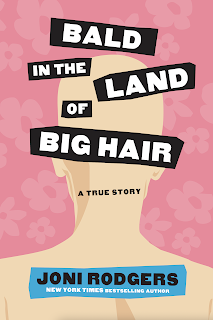When Bald in the Land of Big Hair was originally published by Harper Collins in 2001, I had no reason to expect that this funny little book by a nobody novelist would take on a quietly powerful life of its own. During its first year, BLBH was translated and published around the world, condensed by Reader’s Digest, excerpted in Good Housekeeping, and featured in a special on Oprah’s new TV channel. Later, it was adapted for an off-Broadway touring show, and in 2011, a 10th anniversary edition was published with a lovely forward by Elizabeth Berg. This book put my name on the bestseller lists for the first time, launched a robust public speaking side gig, and opened the door for my unexpected career as a ghostwriter and memoir guru.
All this was tremendously rewarding, and I’m grateful. An intensely personal memoir takes a lot out of a person; there’s a cost to the author and her family. This book was the realization of the promise in Ecclesiastes: Cast your bread upon the water; in time, it will return a hundredfold. For me, the greatest gift has been 20-plus years of rich correspondence and chance encounters with readers.
About five years after Bald in the Land of Big Hair was published, I received a long, heart-wrenching email from a Wall Street executive whose daughter, like me, was diagnosed with lymphoma as a young mom. He told me someone had given her an autographed copy of my book. As she struggled through a grueling year of chemo, she’d read it several times and copied bits and quotes from it on Post-it notes that peppered her bathroom mirror, bulletin boards, and refrigerator.
“She wanted to talk to me about what she was going through,” he said, “but I wanted to keep up that damn stupid positive attitude.”
Frustrated, she’d told him, “If you ever want to know what it was really like, read this book.”
She always took it with her when she checked into the hospital, so she had it with her when she began losing ground and slipped into an end stage haze. The man pulled his chair close to the bed and read the whole book to his daughter during the long last night of her life. In the morning, he wrote to me: “They say it’ll be another hour or two.”
He said he felt compelled to email me because he’d missed his opportunity to talk to her about what she was going through, but now he felt as though he’d laughed and cried with her, that he’d shared in her journey, and that on some level, she knew, because she knew he would eventually read this book.
“Thank you,” he said, “for giving me a way to reach her.”
It was one of the most precious moments of my writing life.
A few years later, I spoke at a large survivorship event and was signing books afterward, doing my best to hug and listen to each person in the long line but feeling very weary after a long day of travel and workshops. A woman came forward with a hardcover first edition copy of BLBH. The binding was broken, the dust jacket tattered and coffee-stained, and leafing through the dogeared pages, I could see that the well-worn book had been passed from that original reader to a sister, to a friend, to a daughter, to a book club mate, to a neighbor, to a chemo buddy—one reader after another—each adding notes and highlights in a kaleidoscope of colored pencils, inks, highlighters, and sticky notes. My story had become a conversation.
Opening the book to the title page, I saw that I had already signed it back in 2001: To my sister in survivorship—shalom and joy, Joni Rodgers
Not gonna lie. I cried. Oh, how I wish I could have put that gorgeously dilapidated volume in a shadowbox in my office! But it wasn’t mine to keep. When I wrote this book, I made the choice to share my story, and with that choice comes the understanding that writers have no control over how or where our words will land—which is ample reason to choose those words with care.
I launched this little paper sailboat into the stream of consciousness more than two decades ago. Readers are the wind and water that carried it around the world, beyond time, and back to me. It was a profound privilege to hold the proof of that in my hands, a far more meaningful metric for “success” than any bestseller list or bank deposit.
Next to the hurried autograph of the my hopeful young author self, I added a brief note from my older, wiser self and sent the book on its way.
It belongs to you now. May it bring you peace.
A refreshed ebook edition of Bald in the Land of Big Hair is now available. The original paperback editions is available wherever books are sold.















